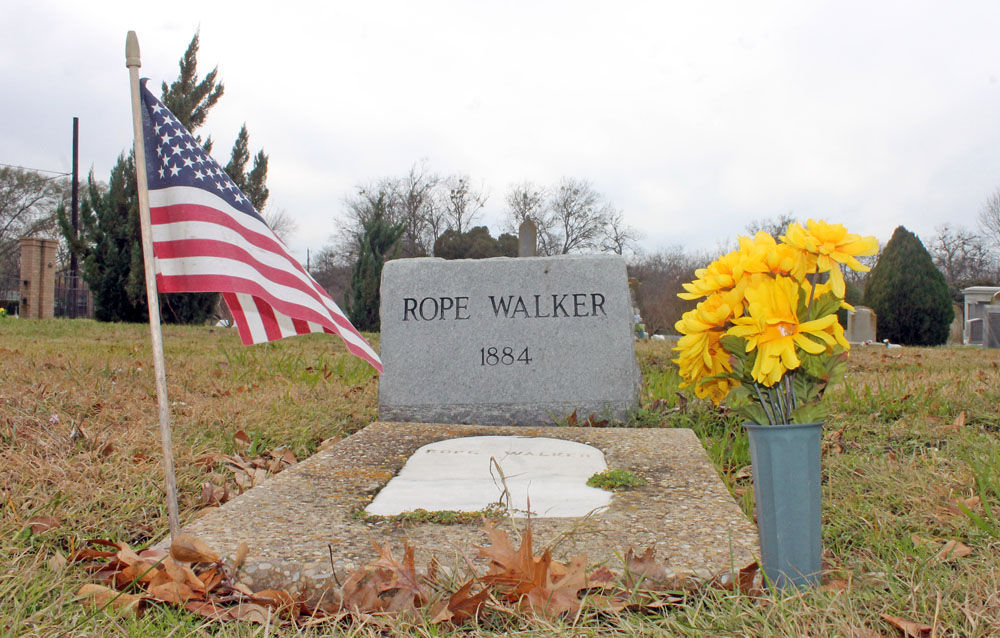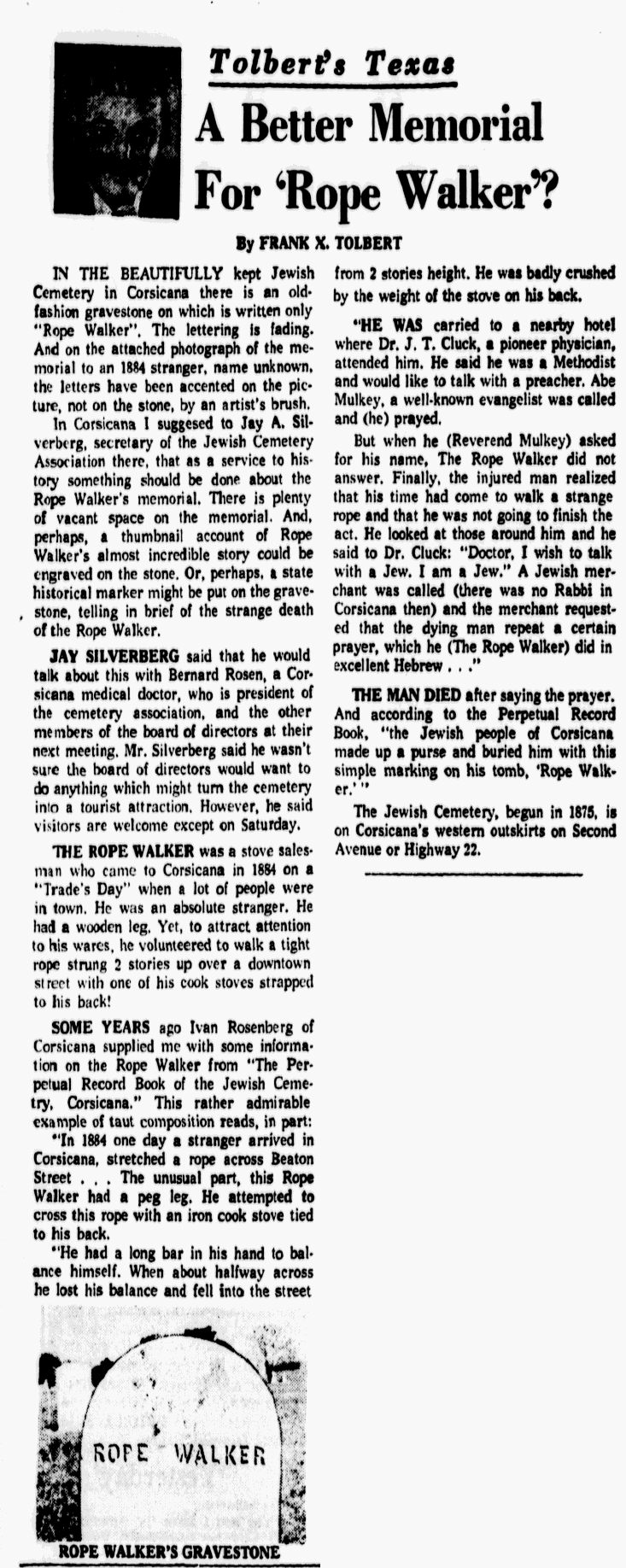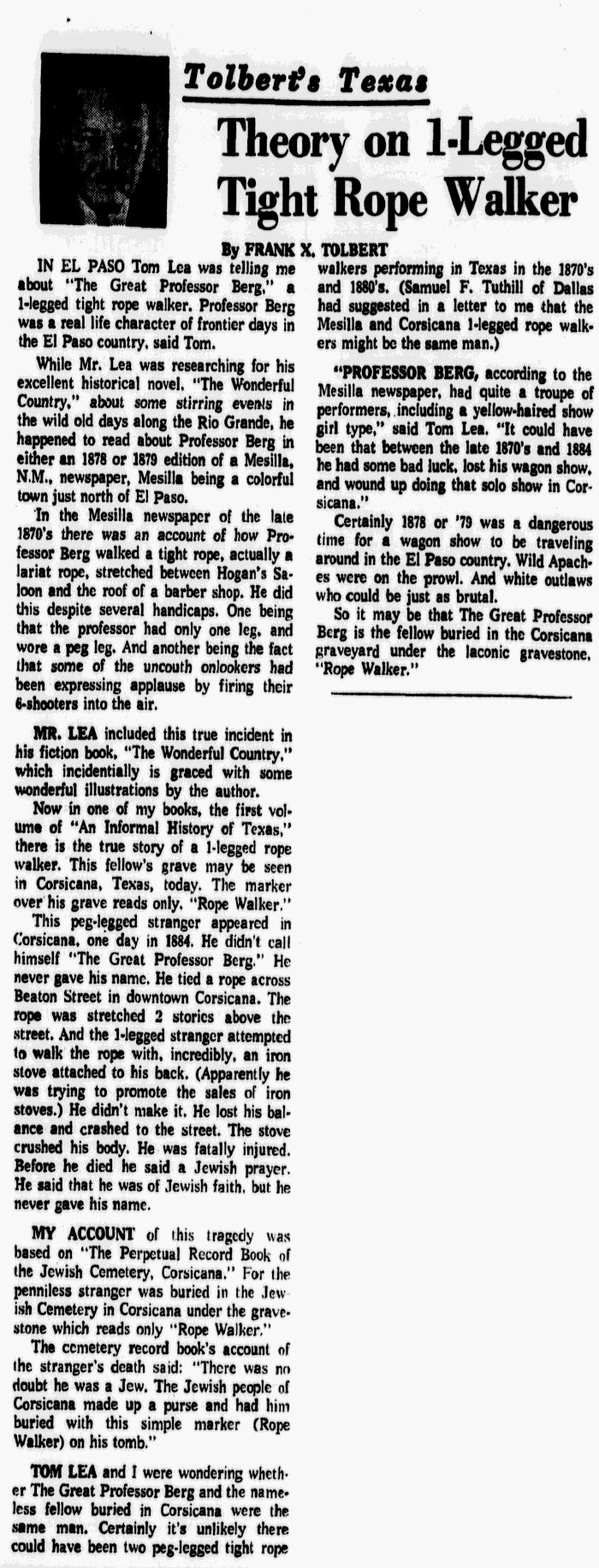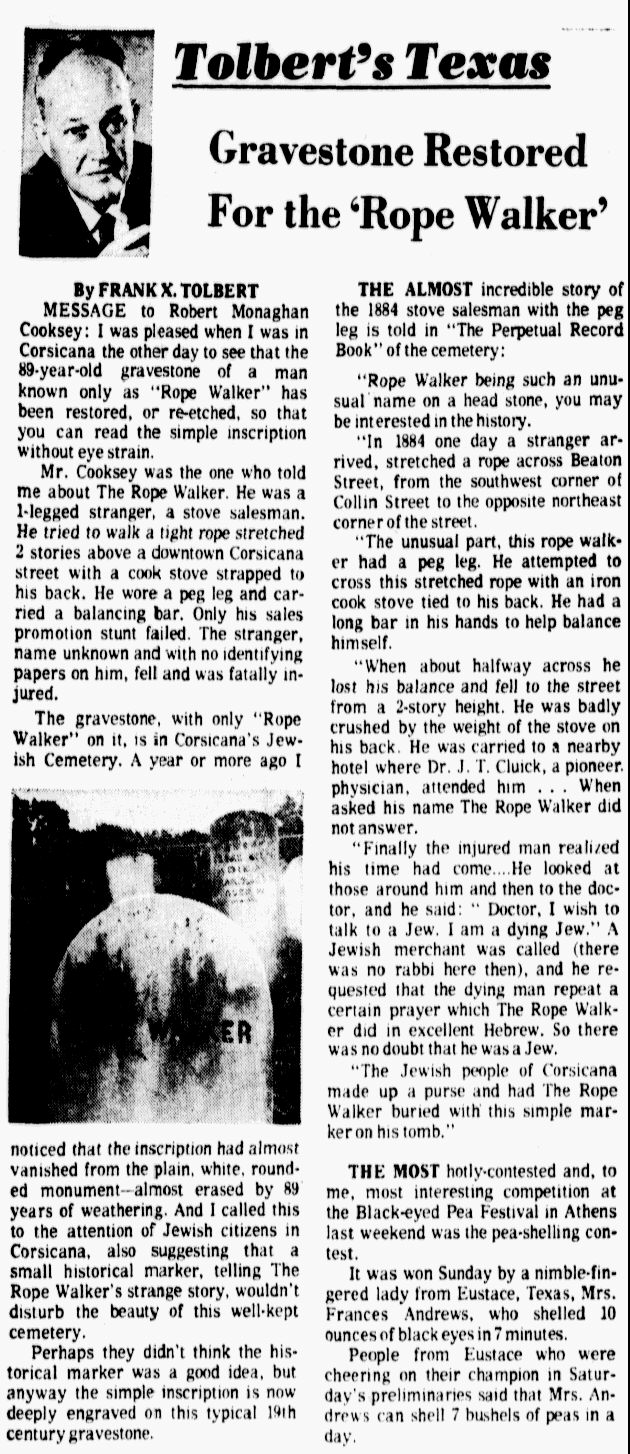|
Rope Walker - The Short Version In the late 1890s a one-legged tight-wire walker was performing his act in downtown Corsicana as a promotion to bring people to town. He would walk a rope stretched across Beaton street from the tops of two buildings. The rope walker carried a cast iron stove on his back to add to the trick. On July 28, 1898, the 69 year old man, who claimed to have been born in Princeton, New Jersey on February 6, 1829, was performing his tight rope performance when the rope sagged excessively and he fell while halfway across Beaton Street. Mortally injured, the man called for a rabbi. There were none to be found but a Jewish merchant prayed with him in Hebrew. The dying man stated his date and place of birth but no cone could remember if he have his name and he was never identified. He was buried in the Hebrew Cemetery in Corsicana. His headstone simply reads "ROPE WALKER" ARTICLES The Rope Walker News articles are posted below by Published Date ROPE WALKER The Dallas Morning News - July 20, 1958
The Dallas Morning News - February 26, 1968
The Dallas Morning News - May 18, 1968
The Dallas Morning News - August 7, 1973
CORSICANA SESQUICENTENNIAL Mystery stories have always seemed to catch the eye of listeners and readers. For both Corsicana and Navarro County residents who have heard the many different stories about the famous Beaton Street rope walker and the bitter elephant Black Diamond, mystery still remains a key factor. Many questions can be asked about the Peg-legged Rope Walker and his feeble attempts to tight rope walk across Beaton Street in downtown Corsicana with a stove strapped across his back. Through the years, many stories about Rope Walker have been told. One story says that in 1884 a stranger arrived in town, stretched a wire across Beaton Street from the southeast corner of Collins Street to the opposite northwest corner of the street. The most unusual part about the wire walker was the fact he had a wooden leg. The man then attempted to cross the wire on his one good leg and the wood peg-leg with a cook stove tied on his back. The rope walker used a long bar in his hand to help balance himself, but as he made it just halfway across the wire, he lost his balance and fell to the street. Of course, the heave weight of the stove badly crushed the man. He was immediately picked up and carried to a nearby hotel where Dr. J. T. Gluick, a pioneer physician tended to him. When the rope walker first fell, he had stated he was Methodist and would like to see a preacher, so Abe Mulkey, a famous evangelist was called upon to pray for him. When Rope Walker was asked his name, he turned his head and did not answer. He was asked once again about his relatives and home and again he did not answer. Finally, the man realized he was dying and looked around and then to the doctor and said, "Doc, I wish to talk with a Jew. I am a dying Jew." The startled Protestants withdrew from the hotel room and they rejoined the crowds on the street. Soon, the strange story spread around town that this man who had denied his religion and in the face of death had deserted his teachings, barely snatched them back in time. A Jewish merchant was called (there were no Rabbis in Corsicana at that time) and he requested the dying man to repeat a certain prayer, which the man did in excellent Hebrew and there was no doubt he was a Jew. Some other stories that have circulated around over the years is that the man was a middle-aged artist whose peg-leg prevented his working for big-time shows. One tale says he was hired by a group of Corsicana merchants who thought his act would bring crowds to town and stimulate business. It has also been said it was the first time he ever attempted to walk a rope with a heavy cook stove on his back. Some stories say he walked across on a wire and others say it was a rope. Another tale says he was accustomed to a wire rather than a rope and he had not yet mastered the technique of balance. When the rope became slack under the heavy weight, he fell. Supposedly, the man had the peg-leg fitted to the rope. According to different sources, for years, attempts were made to uncover the identity he carried with him to his grave. Descriptions sent to various circus and vaudeville troupes, theaters and newspapers brought no information. Different sources say the man was a stove salesman who came to town on a Trades Day and volunteered to walk the tight rope to attract attention to his goods for sale. After saying the prayer, the man died, and according to the Perpetual Record Book of the Jewish Cemetery, which is located on the west end of Corsicana on Second Ave. behind Lee Elementary School, the Jewish people of Corsicana made up a purse and buried him with the simple marking of "Rope Walker" on his grave. In other newspaper articles, there is a story about a man who called himself "The Great Professor Berg" who was a one-legged tight rope walker. It was supposedly read in a Mesilla, N.M. newspaper in either 1878 or 1879 there was an account of how Professor Berg walked a tight rope, actually a lariat rope, stretched between Hogan's Saloon and the roof of a barber shop. He did this despite several handicaps. One being the fact he only had one leg, and wore a peg-leg. And another being the fact that some of the uncouth onlookers had been expressing applause by firing their six-shooters in the air. The idea of two different peg-legged tight roe walkers performing in Texas in the 1870s and 1880s is pretty farfetched. Professor Berg, according to the Mesilla newspaper, had quite a troupe of performers. It could have been that between the late 1870s and 1884, he had some bad luck, lost his wagon show, and would up doing that solo show in Corsicana. So, it may be true that The Great Professor Berg is the same fellow buried in the Corsicana graveyard under the name of Rope Walker. Corsicana Daily Sun - Sep 13, 1998
|




